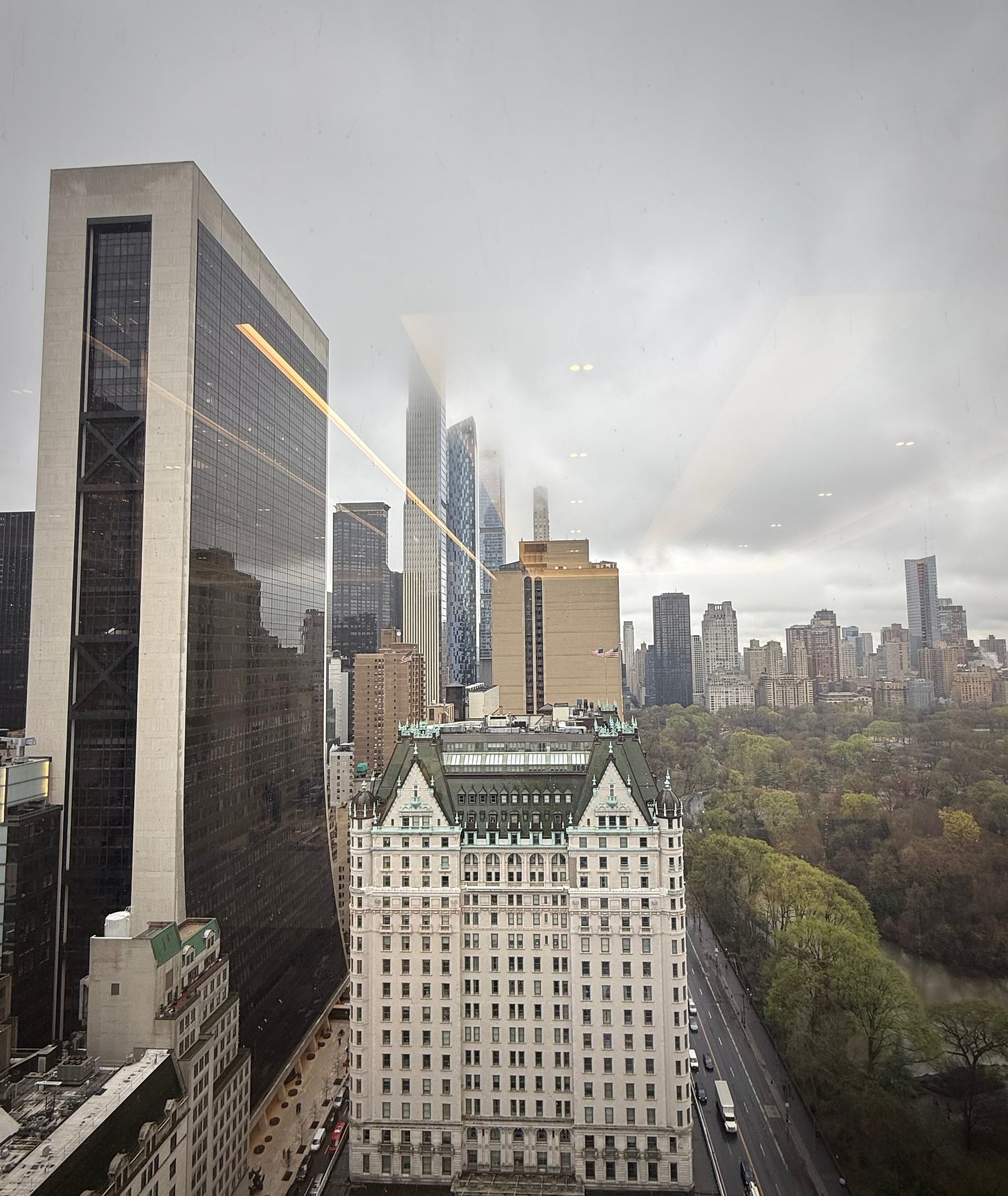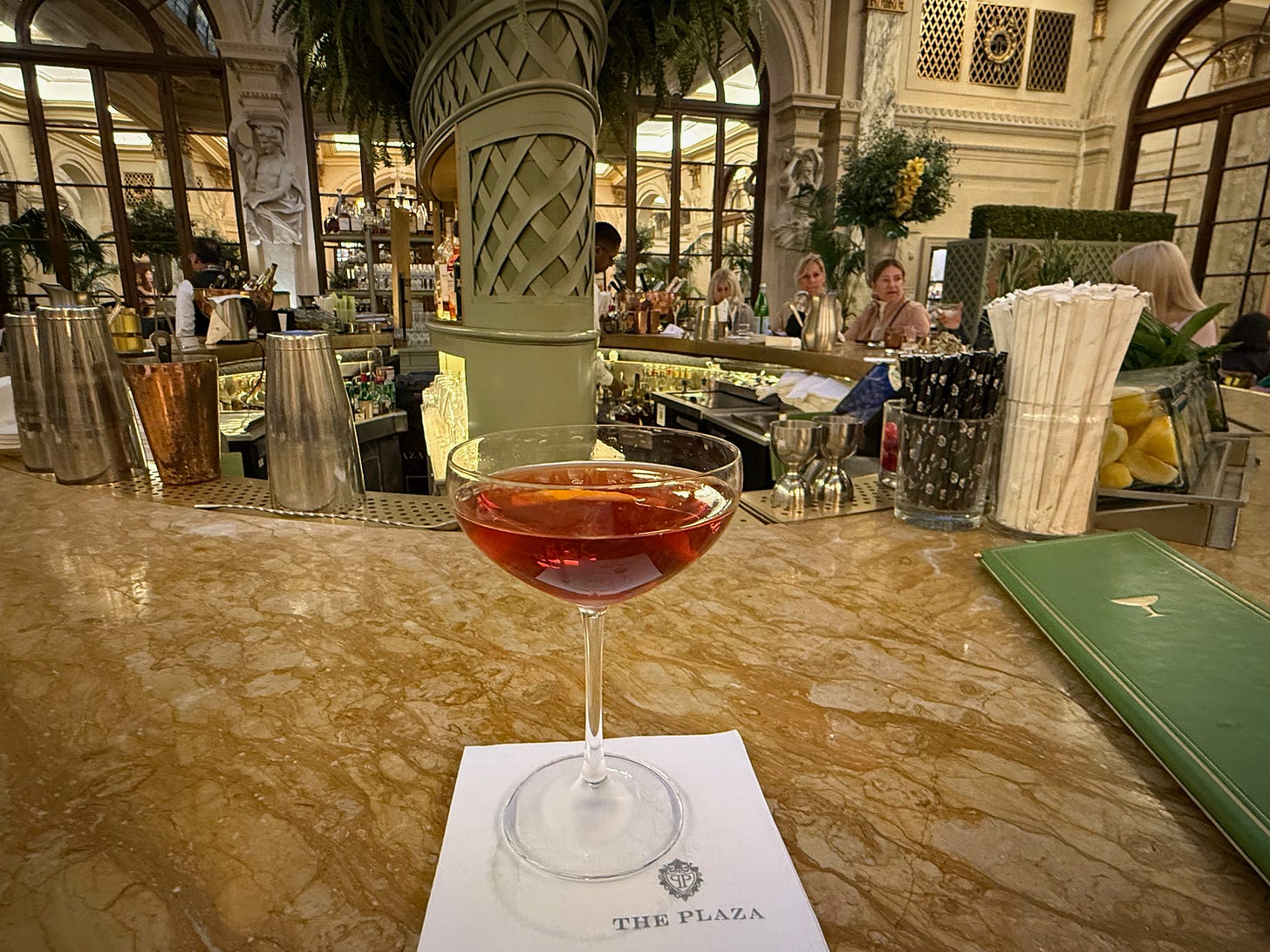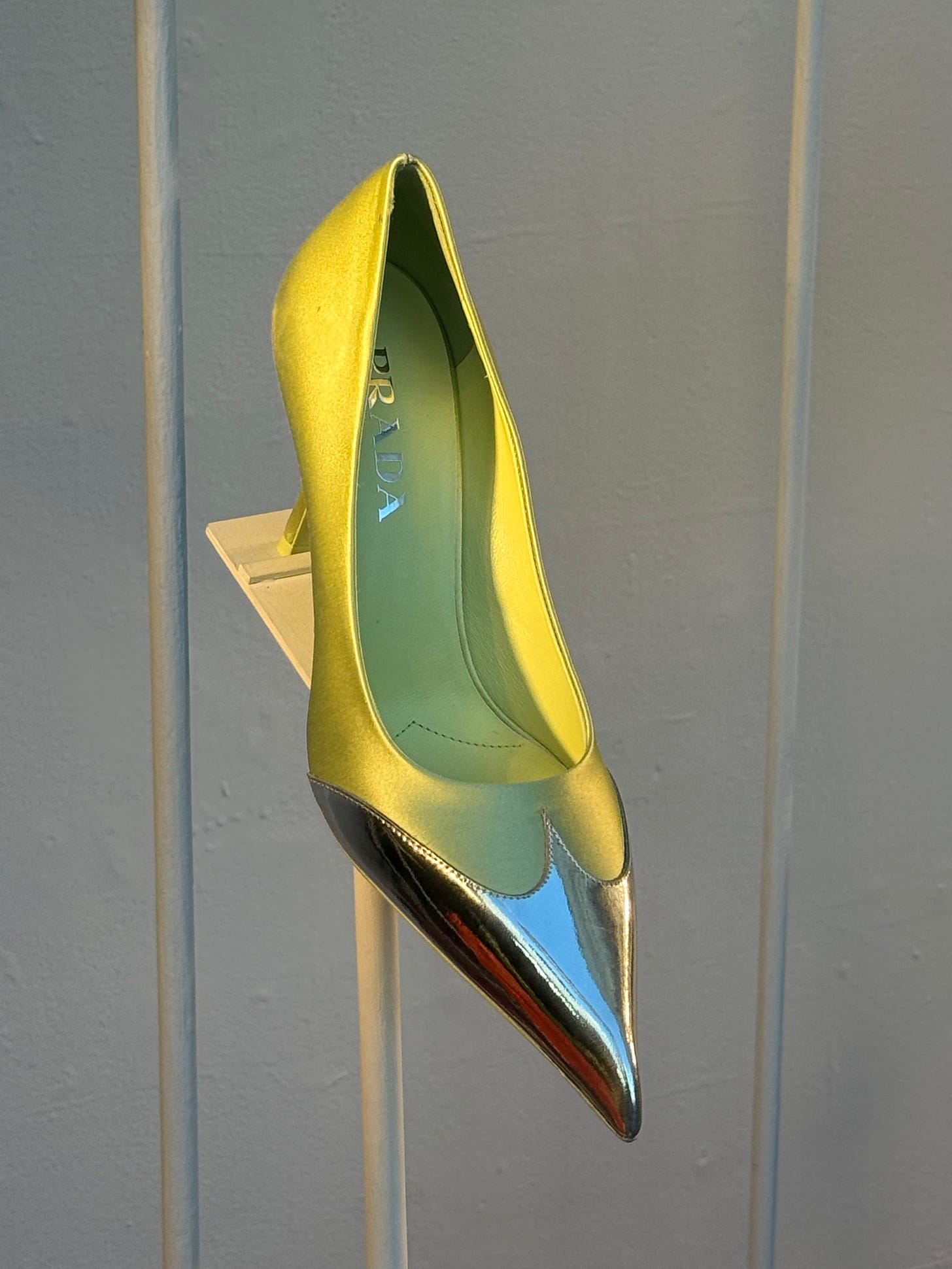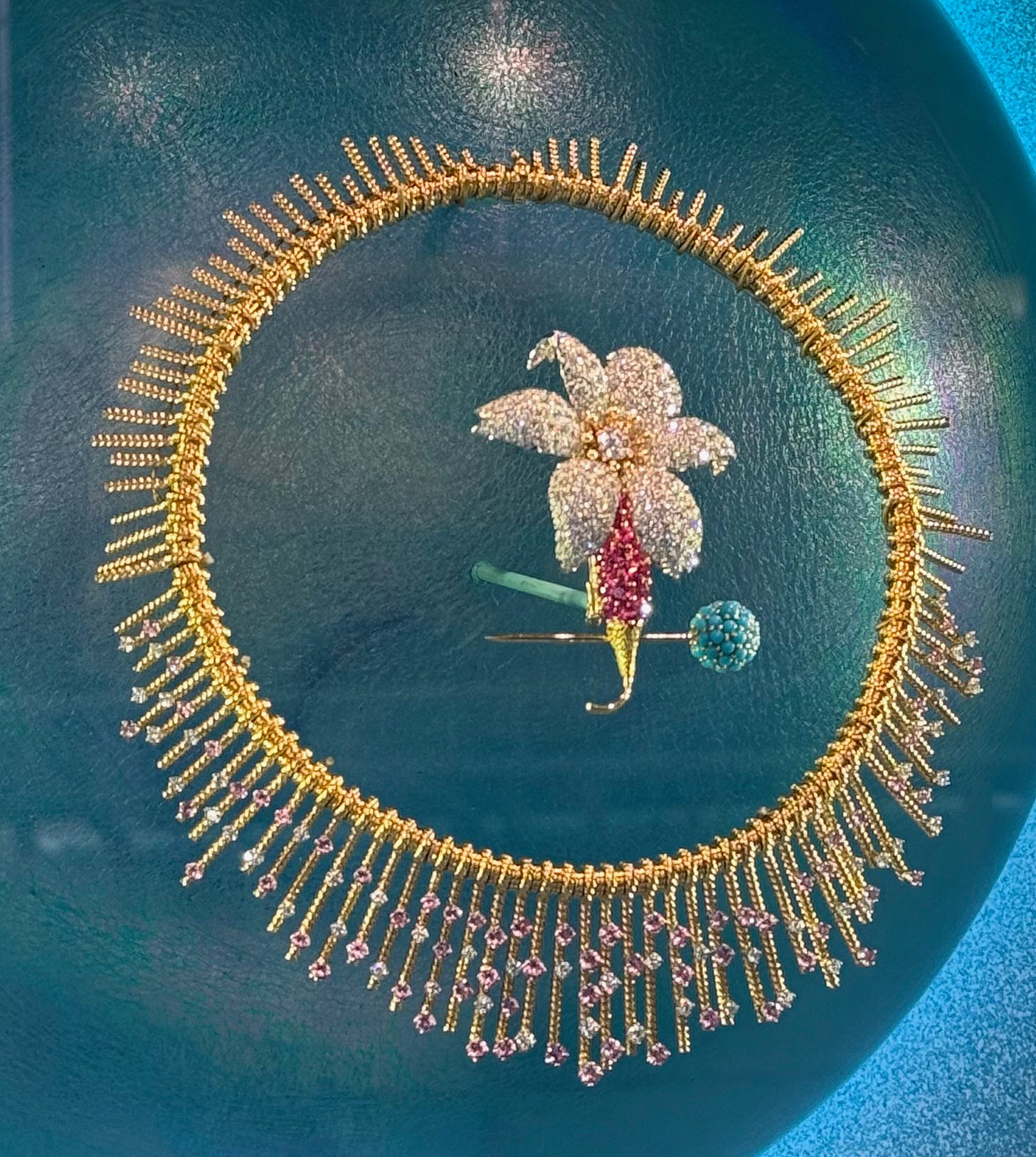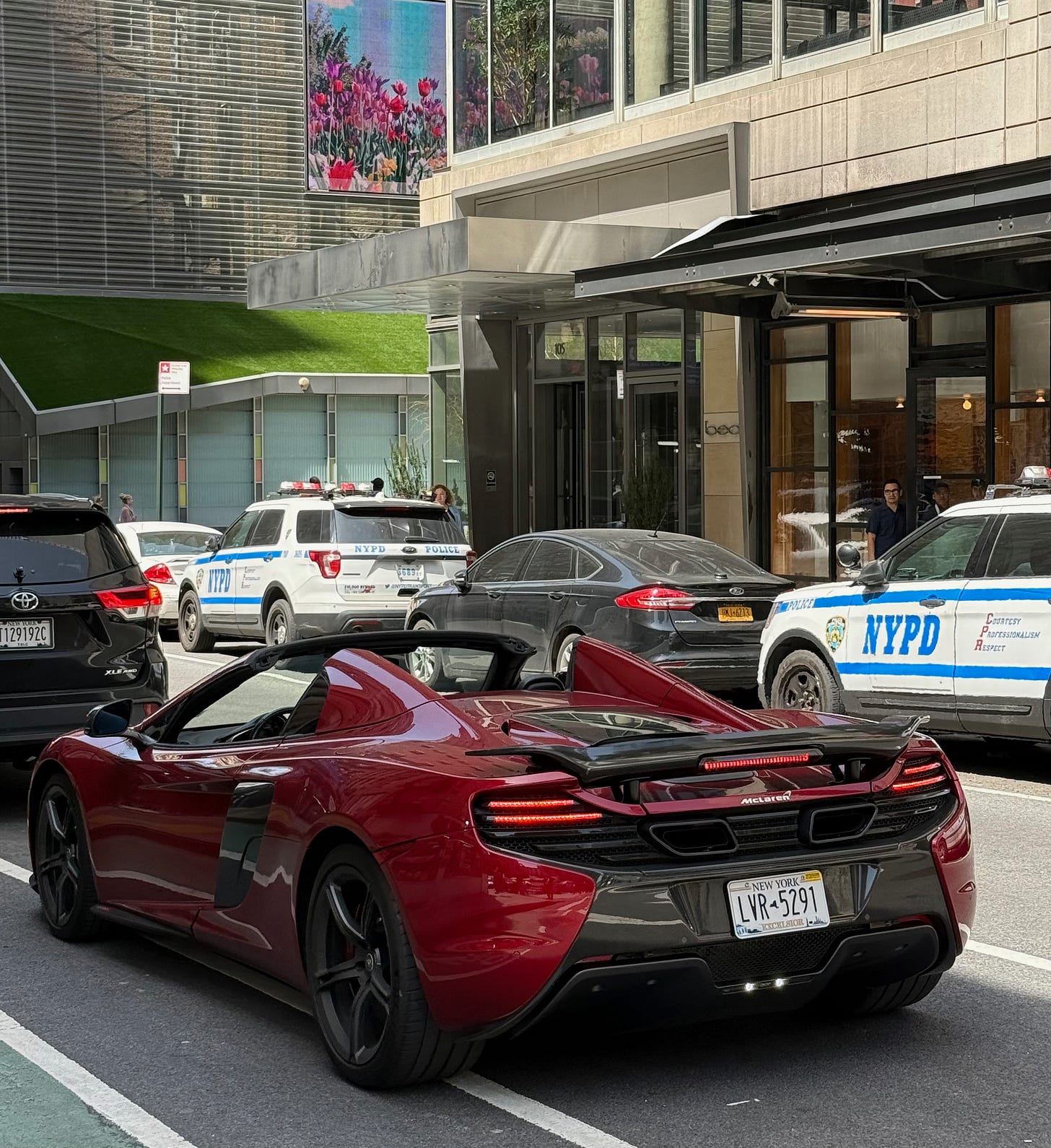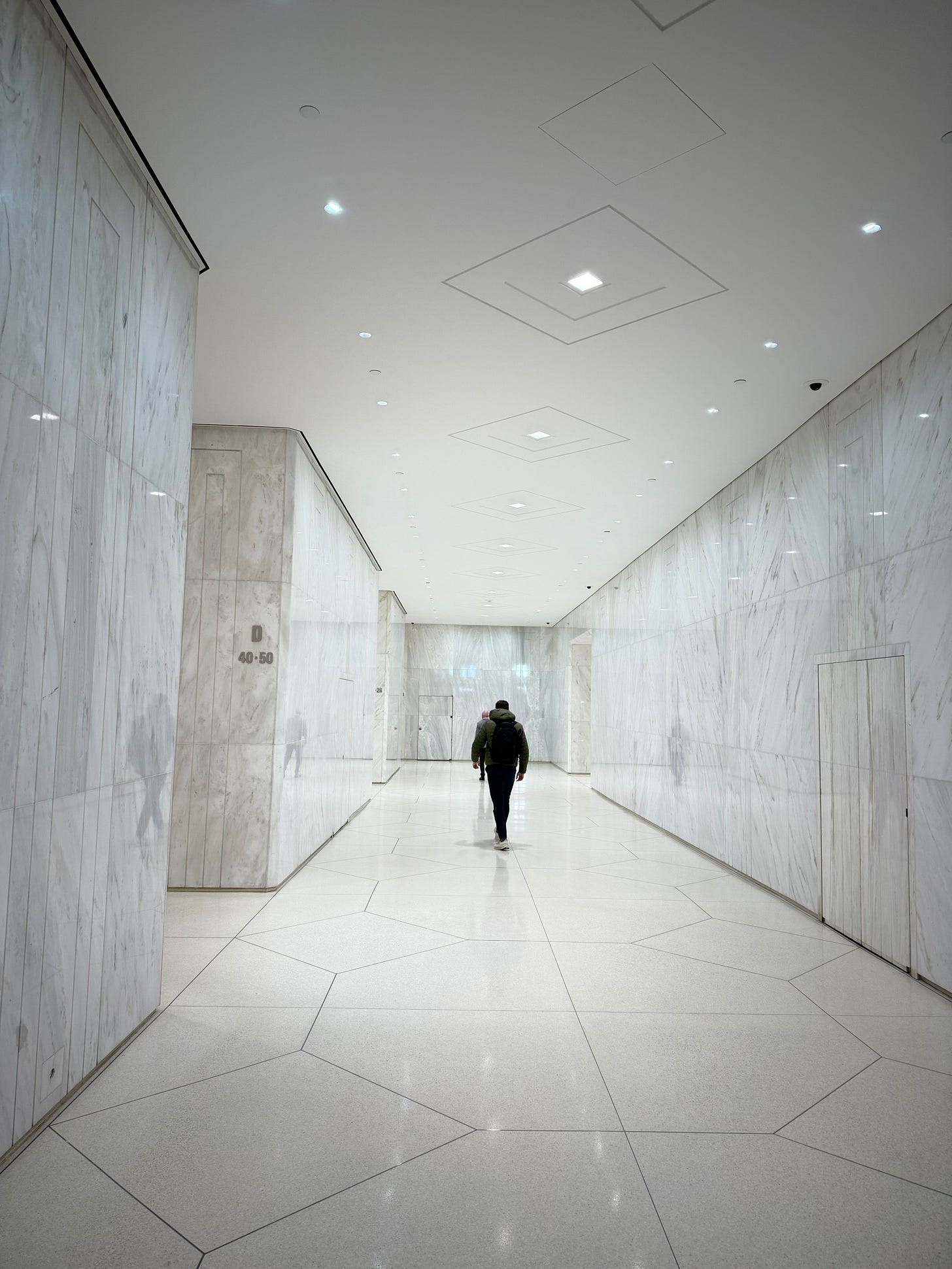Greetings, fellow art lovers,
The view is from a corner conference room in the General Motors Building, a late ‘60s building no longer occupied by the largest car company on the planet, looking west down 59th Street over the Plaza and along the row of pre-War, pre-Crash buildings, highly ornamented stone boxes on the south side of the street, to Columbus Circle and the Trump hotel. To the north of 59th, Central Park is greening up on a rainy spring day, the ramparts of the Upper East Side just visible in the mist. To the south, along 58th, the Solow Tower and Billionaire's Row of pencil shaped supertall apartment buildings. It’s impressive, 150 years of money, beauty and vanity and what is there to say?
I’m not sure how to describe my own feelings, which annoys me. It is good the students got to see it. Educational. As for me, I’m at least appreciative, grateful, a little melancholy. “Thoughtful” would be nice, but that seems too instrumental. My thoughts aren’t going anywhere in particular, I’m walking slowly. “Sonder” is a fine new word (the sense that other people have lives as complex as yours in ways you will never know), but I’m thinking at larger scale, mostly. Still, I feel stories, even know a little but cannot tell, much less engage, much less somehow solve, lay to rest. Just the pressure of people, wealth, history . . . slightly unpleasant, overfull, a faded hangover, the not-rightness of an oncoming cold, of too much salt.
The GM Building may be a masterpiece, or at least feels like one today. Not really my taste, but in the drizzle, against the news, the building projects a collective American confidence that seems lost forever. The art is great. I see Maja Weyermann’s fantastic riff on Philip Johnson’s Farnsworth House, Absence, all glass and emptiness, spectacularly hung. By the time the GM Building actually opened in 1968, however, the moment was not just wanting in principle, but passing in fact. The assassinations, the riots, Vietnam, Watergate, the malaise of the ‘70s. My childhood.
Of course, confidence, or at least vanity, is not somehow over. But the Supertalls, or Trump Tower, hit different than the GM Building, Solow, the nearby Lever Building, and much different than the wealth displayed by the Plaza and all the other prewar buildings for the rich and the superrich of those days, like the just reopened Frick up 5th Avenue to the north. I consider the fantastic pre-war buildings cresting like a wave over the Park on the Upper West Side, and recall Buchan:
“. . . one turns and sees a heavenly city, quite different from any other. There is something frozen, shocked about the Manhattan skyline. It is petrified money . . . the monuments of the Roaring Twenties: the Woolworth and Chrysler buildings and above all, the Empire State, embodiments of interest at 3 ½ per cent and stocks at Irving Fisher’s ‘permanently high plateau,” frozen to death in the cold arms of the Depression.”
Life went on, of course, the City recovered, renewed itself, albeit differently. The GM building and the Supertalls are testament to that. Yet we have reason to know that it could happen again: we could lose our faith in our institutions, our relations, and yes, even our money.
It occurred to me that I had never been in the Plaza, so I took myself to lunch at The Palm Court. I sat at the bar, somebody to talk to, to watch. The bartender was very good, seemed to embody my reading of bartenders, precisely balanced between friendly and reserved. F. Scott Fitzgerald often lived in the Plaza, amply supplied (overserved) with libations. The Great Gatsby has a scene in the Plaza. The bar menu talks about such things, and offers a “barrel aged Old Pal, a cousin of the Negroni that can be traced back to the 1920s and Harry’s New York Bar in Paris.” Indeed. At any rate, it too was good. I thought of Fitzgerald’s friend Hemingway, and how his writing about eating and drinking is what has remained to me. An essay on Gatsby appeared on my phone. Weird, perfect, spooky. I switched to beer and got a lobster roll. The accompanying truffle fries were excellent, a little too salty, and I should not have eaten them all before heading back into the drizzle.
A window display did what it was designed to do and fetched me into Bergdorf Goodman. Shoes as sculpture, realized fantasies of a shoe. Who buys these things? Also, fancy dresses, some nice. I particularly liked a Jill Sander sheath. Andy Warhol got his start drawing shoes. Tiffany’s is across the street. I saw an elaborate broach and necklace there on my way in this morning. Nicolai Tesla designed a fountain for Tiffany’s, but it was never built. There’s a speakeasy with a magically good cocktail called Tiffany’s Fountain, in honor of unrealized ideas, maybe. I walked back to my hotel, back to work.
At the turn of the previous century, Thorstein Veblen wrote Theory of the Leisure Class, a book that should have ended liberal microeconomics. Veblen argued, irrefutably for a man standing in Bergdorf’s, that people seek status, prestige, in markets. Today, we speak of Veblen goods, for which demand perversely rises with the price. The desire for the envy of others, not greed, is the motor that drives economies.
If one believes Veblen, classical economics falls apart. Since Adam Smith, political economy has attempted to ground the social on the autonomous rationally self-interested individual, echoing Hobbes in political philosophy. But, says Veblen, economic actors are neither rational nor really self-interested, and they are in effect slaves to fashions that they do not control. The desire for recognition cannot be satisfied by things as such. The things that matter do so only insofar as they are coveted by others. (Thank you for your diamond status.) And that presumes social structures in which some things are more prestigious than others. Hegel said something like that on X just the other day. Supply and demand, the notion of the more or less efficient distribution of scarce resources through market mechanisms, and the rest sort of . . . fade.
By the same token, the notion of class solidarity and much of the Marxian project also collapses. For “the workers,” anyone lower down the ladder, “solidarity” with fellow members of one’s class is only a rhetorical game, tactics. The real goal is to climb higher, like Soviet apparatchiks trying to get better apartments, CCP functionaries enjoying LVMH goods without the appearance of undue corruption. That’s what class consciousness really means.
For Veblen, the oversexed son of Scandinavian immigrants living in California (too perfect), the ultimate prestige objects were women. Veblen seems to have regarded women like a pastoralist regards horses or camels: numbers matter. Vide de Sade. Somebody said that all the great libertines were utilitarians, which seems right. Rephrased, prestigious things raise a man’s status, crucially in the eyes of women, thereby giving him access to more women, raising his status in the eyes of men, which gives him . . . ah, a virtuous circle, the meaning of life no doubt. It would be trite to list contemporary examples of this kind of thinking. Oh, but I can’t resist one: in South Africa I overheard a well-heeled Englishwoman telling her (adult) daughter about competition among male lions for pride dominance, “because then you get to shag the most lionesses, and that’s the point, isn’t it darling?”
Working from memory, I’m fairly confident that Veblen thought he was being more truthful about how adults actually behave in what is now unblushingly called the marriage market, and other markets, too. But he might have thought something more, i.e., that by replacing rational greed with lust as the motivating force in markets, he could improve on Adam Smith and make economics actually work as a science. For reasons I’ve already suggested and will elaborate on below, I think that is wrong. But, sitting on this plane, I do not know what Veblen himself thought. Maybe I’ll give that question to a research assistant.
Which brings me to
, a writer of many talents – playwright, theater impresario, poet, novelist. He is a little out of time, maybe, an old-fashioned man of letters by sheer strength of will. I admire that, a lot. Gasda and I are friendly, and I didn’t mean to review his new novel, The Sleepers, not exactly. I’m not being coy; I recommend it. For a thoughtful review, see ARX-HAN's Review of The Sleepers. But I did want to respond to the book, and by extension much of his other work, partially because I find his ideas so disturbing. In so doing, however, I sort of reviewed the book. Call it a review of ideas? Whatever.Gasda is observant, a realist in the simple sense of a writer who tries to describe some milieu as it really is. He has a keen eye and a sharper ear. Critics mention Chekhov without irony, both doctors diagnosing symptoms? Gasda’s dramatic world comprises people who think of themselves as “creatives,” mostly in their 30s, often in Brooklyn. All are educated, and some are academics, or more often, academic adjacent, not that institutionally successful. All are intensely online; their relationships are largely digitally mediated. Most come from some, some come from substantial, money.
In another sense, however, Gasda is not a “realist” at all, or at least not in the simple way I just used the word. In The Sleepers, his breakthrough play Dimes Square, and elsewhere, Gasda’s work is talky, halting, circling meanings that his characters struggle to speak and hear. His undergraduate degree is in philosophy, and Gasda creates situations that call for philosophy, raises problems that his people try to resolve while sensing their failure to do so. All of Gasda’s characters are searching for meaning in their lives, in the society in which they live, and in the culture to which they claim to want to contribute. (To be clear in this overly partisan moment, Gasda is in no way doctrinaire, i.e., I meant “philosophy” seriously.)
Insofar as this work is realist, it is so because we really do have: a surfeit of fairly young, educated and otherwise privileged people whose lives are felt to be and indeed are rather meaningless; elites who have no sense of obligation, little sense of how they might be proud to serve their fellows or the polity; and would-be artists, including the few who are talented, diligent, and lucky enough to have a shot at doing something, who quite reasonably do not know how to make art amidst a sea of digital slop in a world of declining attention spans. It’s pretty grim. The use of sparse dialog to impose grave problems upon characters who have few resources on which to draw reminds me of Samuel Beckett.
The (would be) creatives that preoccupy Gasda often espouse leftist or anti-capitalist politics. They rage against the machine, as the saying goes. They think little of, even scorn the affluent, ambitious, and often handsome young men and not a few women who make their money in finance or finance adjacent law and who have ruined Brooklyn. Gasda’s creatives see society as the unjust product of money, and see themselves as implicitly in opposition, in search of something more meaningful than mere wealth.
Their searches take three different basic and traditionally romantic forms, viz., hunts for art, love or place. The more idealistic tell themselves they are looking to create great art. The more cynical admit they are really interested in fame, but fame as an artist. Rivalries abound. The other great, even greater, preoccupation is said to be love, whatever that means in the age of the algorithm. Whatever the allied idea of romanticism means, or might come to mean, at the very least among Gasda’s creatives it seems to include a lot of sex, coupled (as it were) with a preoccupation for finding “the one.” One more Tinder swipe, no doubt. And, it goes without saying, this all happens in New York.
Not incidentally, this is a very hot field of discussion (topoi) on Substack, i.e., Gasda is giving dramatic forms to a range of discontents with and hopes for the contemporary. I’m not going to attempt to survey, much less do justice to, this range, but many folks are claiming to be romantics, or calling for a new romanticism, some way of finding meaning in a world said to be disenchanted. (I might be guilty here.) There are very erudite arguments about what Romanticism historically really meant, and what it might mean now, vis a vis technology, or the ancient and modern predicaments of sex and the family, or art. Romantics quote Goethe about romanticism being a sickness. It’s an interesting moment, intellectually. But there is real unhappiness here, too, and that’s what I’m trying to address.
The explicit anti-capitalism of his characters tends to be some blend of young, disingenuous, or downright hypocritical, as Gasda rather wickedly often points out. But something deeper and more troubling is at issue. Even the romantic rebellion of Gasda’s characters is in some essential sense capitalist in ways Veblen, if not Adam Smith, might have approved. Gasden’s creatives have replaced the rather Neanderthal, they might say philistine, Homo economicus, native to nowhere places, with a far more fluid, stylish, soulful, modern Homo eroticus, indigenous to Bushwick. In Veblen’s view, material goods and even money were useful for establishing prestige, which both validated and enhanced one’s standing, enabling ostentatious conquest. In a world motivated by the desire for status, lust for the envy of others, that is what “meaningful” means. But to update: if standing is the point, why bother overmuch with goods and money, if other sources of prestige, and especially sex, are available?
Unfortunately for the materially comfortable, physically pretty, and digitally connected denizens of Gasda’s milieu, for whom horny is the default setting and making oneself available is only polite, sex is simply too common to provide much meaning. If, per Veblen, sex is the real currency, then it’s been devalued. In hindsight, Veblen’s argument relied on the so-called Victorian suppression of sex that Veblen (and many bohemians admired by this crowd) mocked. Nowadays, fornication simply does not signify very much. In their erotic relationships, as with their other relationships to people and to things, Gasda’s creatives live in a mass society, in which they are uninteresting even to themselves, no more individual, meaningful, or really cared for than some rando finance bro in NoMad. Maybe money can’t buy you love, but in a sufficiently permissive environment (like 30 something NYC) love sucks as money.
Sometimes, romantic rebellion is undertaken for obvious reasons. Lancelot loves Guinevere, and is willing to break his oath and otherwise rebel against his duties as a knight. But sometimes “rebellion,” or simply taking an oppositional stance against a structure of meaning (tradition, convention, etc.), is done not for some transcendent one or thing, but against a structure that no longer seems worthy of support, loyalty, even inhabiting. Hence the rebel without a cause. This does not appear to be a stable position; humans need meaning; Gasda’s discontent creatives need meaning. We hear calls for a new romanticism. Few people, in this day and age, are in a position to honestly call themselves romantics, to have found the thing that makes the world magic. But they want to. I am very sympathetic.
As already suggested, there are at least three familiar roads to romantic meaning, but each is hard. Among them, Gasda’s characters try them all, and generally fail to get far. (There are lots of non-romantic roads to meaning that need not concern us here.)
The first is romantic love, and Gasda’s creatives talk endlessly about finding “the one.” The one who will make their own lives, individually and together, meaningful. [So meaningful, meaningful as invocation, as signifier to be filled upon arrival, no doubt heralded by exultation of larks.] When they find a candidate, however, petty differences, suspicions, intolerance, and sheer exhaustion leave them dissatisfied. Meanwhile, their phones hold endless possibilities, perhaps they just have not read the right profile? And so “the one” is often exchanged for “the next one.” As has been widely remarked, millennials tend to treat finding a romantic partner like shopping.
More deeply, the psychology/anthropology of homo eroticus remains aligned with that of classical economics, beginning with its self-regard, in its understanding of “the good” as the realization of the individual’s desire. (Vide my earlier remarks about Veblen correcting Smith and preserving the aspiration toward a scientific economics.) Gasda’s characters are more profoundly capitalist than they imagine; perhaps Gasda himself suspects. I recently heard a panel of women novelists talking about divorce, and about how marriage was about being “on the same page” as one’s spouse, i.e., there was no frustration of desire because desires mirrored one another. And when that mirroring ceased, when circumstances change (and if you live long enough, they will), when things become frustrating, then the marriage is over. It’s no longer what you want; your desires are sovereign; sell it.
Gasda’s romantics long for a beloved who will somehow provide the sense of meaning that the romantic lacks. The dream, the to-be-loved, will fill the hole in the romantic’s soul, will enrich, thereby ending the romantic’s existential poverty. At the same time, like a market actor, the romantic demands that the beloved (the asset) yet conform to the ideas the romantic already holds. Economists like to say “preferences,” which are taken to be preexisting, so we might more candidly say prejudices. Logically, it is an almost impossible desire: make me what I am not, by being just what I [correctly] imagine I want [though I am not in a position to know].
Gasda’s characters do not consider how to love that which is essentially different from themselves. They have no sense of duty when life brings changes, do not really support one another, grow bored easily. No stamina. As any number of critics have pointed out since “romanticism” became a thing, there is something juvenile about all of this. Gasda’s characters are young beyond their years, and retain the profound self-centeredness of both the finance they believe they oppose and the adolescence they claim to have left. It’s forgivable for a youth (college), until it becomes ridiculous, sad, and occasionally lethal, almost tragic, and Gasda goes there from time to time.
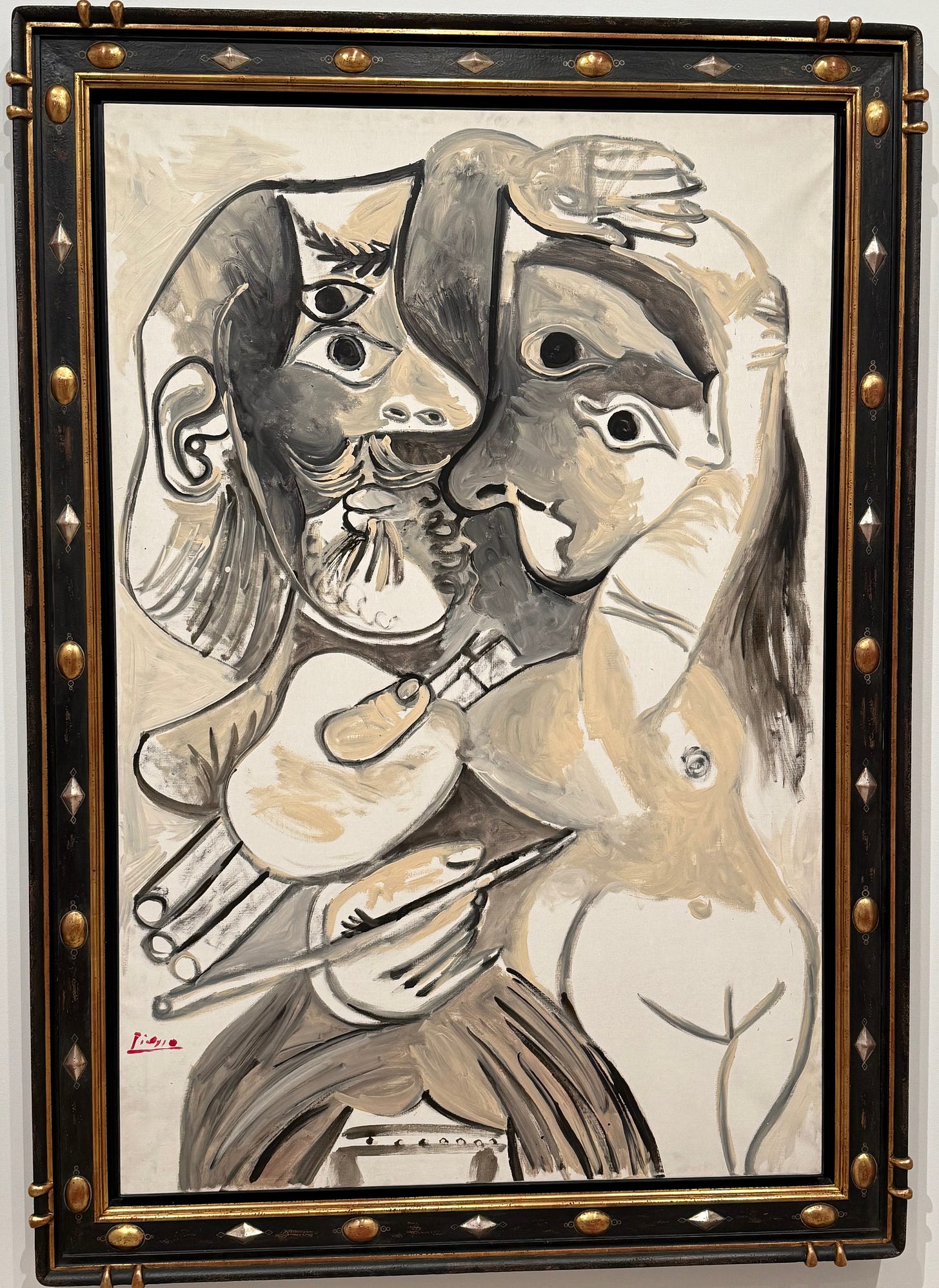
Second, the would be romantic might try to find meaning through art, I mean, Art. It is never quite clear why Art is meaningful, although sometimes the Meaningful and Art are simply conflated. Beauty is truth and truth beauty etc. The familiar practical difficulty is that art is difficult. It requires work, and rarely comes early or untutored. Prodigies and young stars tend to start as children, within structures, not as rebels. Most artists must have great faith. They must believe that, with hard work over time, they will eventually produce something good. Until then, though . . . it’s not all that rewarding. No blaze of meaning. And all that presumes talent, which appears to be unevenly distributed, to be gentle. Many of Gasda’s artistic characters are disappointments. Some stop working. Others find, with the destruction of their egos, that “pretty good” is no small accomplishment. It may be enough. But that is not a romantic sentiment.
The third road to meaning is place, these days, the road to New York City. Historically, the Romantics asserted that some places just were meaningful: mountains, foggy or stormy seas, ruins. The usual reference is Caspar David Friedrich, for whom “nature” seemed to mean, maybe simply be, God, the sublime, the sensitive individual, all somehow merged into one. For the Romantic soul, just being in such a place was full of meaning. For Gasda’s creatives, the place to be, if one is to be someone, is New York City. (As much as I love New York, I find this prejudice parochial and at bottom insecure, if deeply human. One sees the same phenomenon in all capitals. Ah, vanity.)
Assuming that one buys this idea, that residence (artist in residence?) will in fact be meaningful, practical problems abound. New York City is expensive. Costs are high, and income is relatively low. With a few exceptions, one can almost always make more real money, sometimes absolutely and certainly net, outside NYC. Moreover, NYC is hard to live in for reasons I need not catalog. Worse, it is a city where people come and go, where many people are unattached and there is little way or reason for them to form attachments. An easy place to be lonely, even homeless.
In the great swamp of my digital reading, some woman wrote that she wanted to be a mother, to love her children, but she could not afford to have children in a city in which she wanted to live, and now it was too late. She was still hoping to marry and adopt. Her priorities are pretty clear: place trumps money (she could have moved and been wealthier, maybe wealthy enough to afford children), and money trumps the desire for children (which she will only consider having children at a certain level of wealth). In the same vein, one of Gasda’s characters is offered the chance to leave New York, to be saved like Socrates would have been had he chosen to leave Athens. Neither moves.
As I said, maybe especially from the perspective of the prior generation, Gasda’s work is very disturbing. He not unsympathetically but objectively describes people who are foolish and a little too entitled, yet with real problems that they have limited resources to address. Our society is indeed in many ways dehumanizing, even if “neoliberal capitalism” is almost always shallow handwaving. People are adrift. How to raise children and make good art are always real problems, but they seem particularly acute at the moment. Gen X Romanticism, at least taken on its philosophical terms, provides insufficient responses. That much Gasda pretty conclusively demonstrates.
And yet, and yet, I resist. Partially because that is my duty, but also because I think this picture is too bleak. Plays may be vehicles for philosophy, maybe the vehicle, but, like life, there is always something more to dialog than any propositions, even thoughts, the words may express. [As I have been trying to illustrate with this essay.] More concretely, people do grow up, and babies are born. Juvenalia is not sustained; the truly other arrives. We ourselves become different from our youthful selves. One of Gasda’s characters marries a finance bro, becomes a mother and a pretty good artist, and perhaps understands that life and work are meaningful, to say nothing of presumed by art. Another begins thinking about the generation above him, and realizes that his problems are not entirely new. Gasda himself works like a dog, has talent, and is making meaningful art. As Ross Barkan insists and exemplifies, humans need to make art, and artists will find ways, are finding ways, on Substack and elsewhere. Even the Manhattan skyline renews itself. Maybe it’s worth remembering that, by the time he painted “Wanderer Above the Sea of Fog,” Caspar David Friedrich was 43, happily married with three children, engaged in a community of artists, and teaching.
Perhaps the romanticism of our age will be different from the romantic ideals we know how to articulate, now, and different from what we a bit foolishly demand?
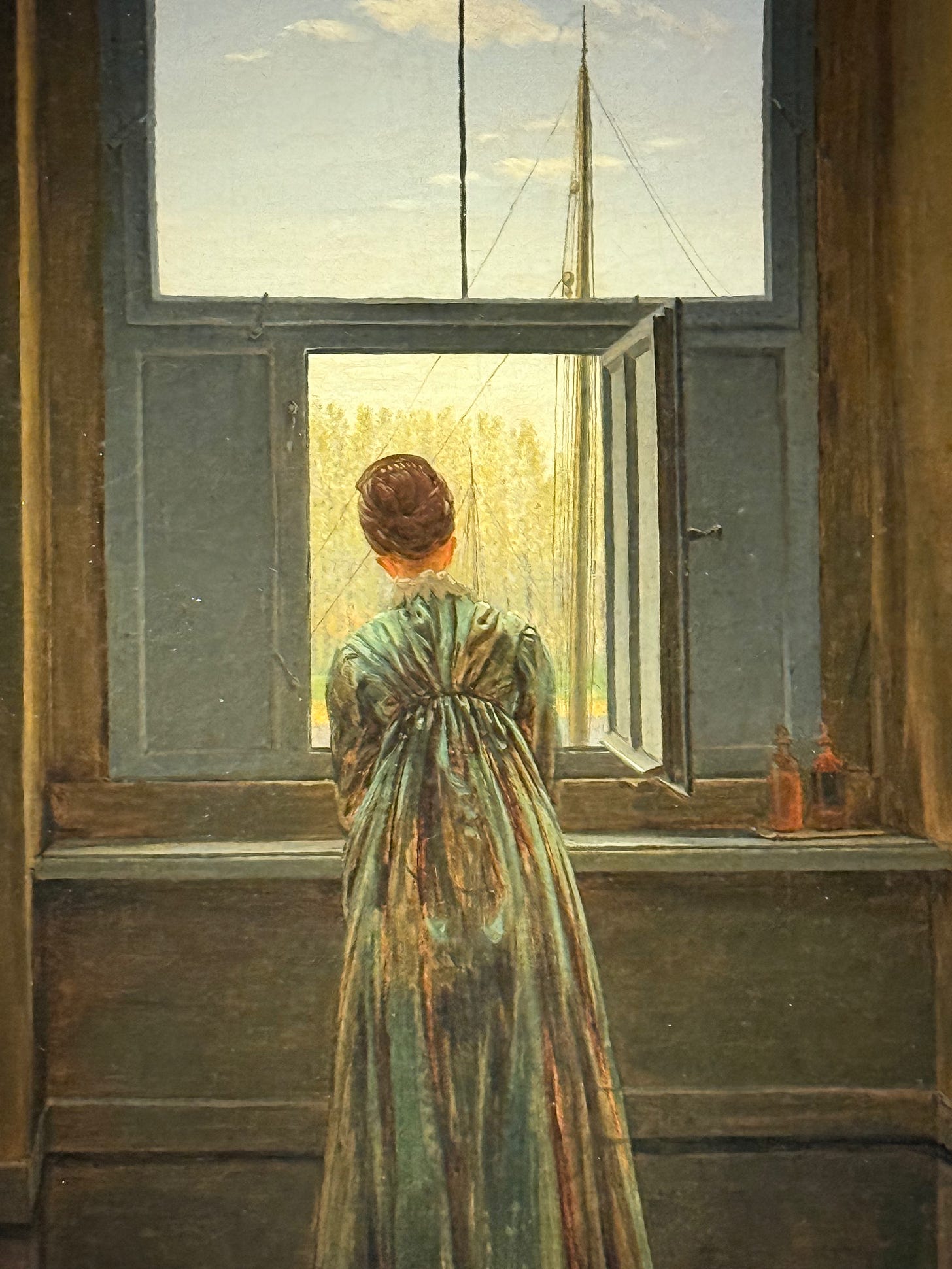
Let me go back to food, as both memory and indirect response to much of the foregoing. An old friend, long ago a mentor, invited me to a fine dinner. It is a little tradition between us. This place was glamorous since before the Kennedys, and since then, too. There was a “captain” as well as a “somme” (hipster for “sommelier” I gather), and multiple waiters and attendants of various ranks. Complex staffing is a decidedly mixed signal. In such places the food will be expensive, but almost always good, maybe exquisite, occasionally a wonderful new experience. It’s a fair trade, as the finance people say. There is, however, a catch: serious “service” sees itself as in charge of the meal, the timing, the experience, i.e., in command. Hence “captain,” not just of the wait staff, but of the diners. So, one pays not so much to order, but to be ordered? A touch of the whip with your Hamachi, sir? Veblen raises an eyebrow and smiles. (Edward Frame, then a captain at 11 Madison Park, wrote a classic, darkly funny, essay about the pleasures of decadence: Dinner and Deception.)
My friend was not and I was only lightly drinking, and it became clear that neither a Grand Cru Burgundy nor a Dark Lord of Napa would be ordered. Sensibly, the staff cut their losses and dialed back their attention, leaving us to talk, which after all is why we were there. It was good to catch up, to exchange some of the troubles and good things, how about children and spouses, and what were our hopes, worries, and comments? The room was beautiful, old school. It was a very mature crowd, except for the young man next to me, dining with what I imagined to be his rich uncle in a 19th century novel. The food was classic, impeccable, and, mindful of the clientele’s median age, left plenty of space on the plate. Unfortunately, unlike most of my fellow diners, I’d walked to the Upper East Side, and was very hungry.
When it came time for dessert, my friend told me that Bananas Foster had been “a big thing” for his father. In memory, my friend ordered the dessert whenever it was available, and this was certainly the right sort of place. We therefore both had Bananas Foster, flambéed of course, and served with rum raisin ice cream. There was a gracious plenty and it was lovely.
Safe travels.
-- David A. Westbrook
Intermittent Signal is read in all 50 states (finally!) and 83 countries.
If you want to support my work, please feel encouraged to take out a paid subscription. If you are not in the mood or a position to do so, please share with a friend.




